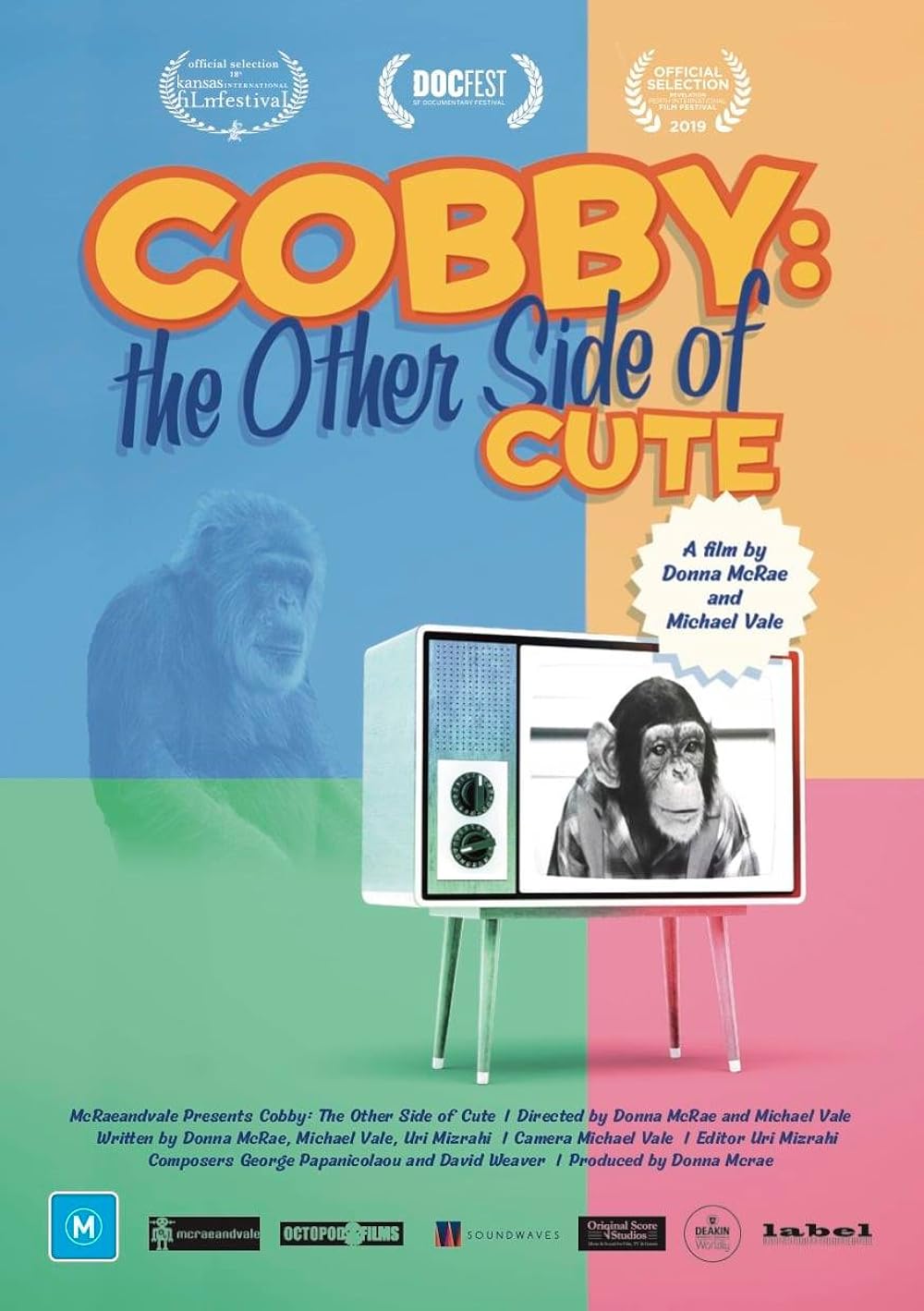Document
Cobby: The Other Side of Cute
“Cobby: The Other Side of Cute” (2018) is a profound and touching documentary that explores the life of Cobby, a male chimpanzee who became a beloved figure in the San Francisco Zoo. This documentary not only delves into Cobby’s story but also raises significant questions about the treatment of animals in captivity, the human-animal bond, and the ethical implications of keeping wild animals as pets and entertainers. Here is a detailed summary of this captivating documentary:
Introduction: Who is Cobby?

The documentary opens by introducing Cobby, a chimpanzee who spent most of his life in the San Francisco Zoo. Cobby was not just any animal in the zoo; he was an iconic figure, loved by visitors and staff alike. The film sets the stage by depicting the zoo’s environment and Cobby’s place in it, showing how he interacted with both his environment and the people around him.
Cobby’s Early Life
“Cobby: The Other Side of Cute” takes the audience back to the early life of Cobby, revealing that he was born in the wild but was captured and brought to the United States in the late 1950s. Initially, Cobby, along with two female chimpanzees, was a part of a popular children’s television show. The documentary provides a glimpse into the world of animal performers during that era, highlighting how Cobby and his companions were dressed in clothes, trained to perform various tricks, and became television stars.
The Reality of Show Business
As the film progresses, it presents the darker side of using animals for entertainment. The documentary includes interviews with experts and historians who discuss the physical and psychological impacts of such a life on animals like Cobby. It points out the lack of regulations at the time and how such practices led to long-term behavioral and health issues in animals.
Cobby’s Life at the Zoo
The documentary then shifts focus to Cobby’s life after his TV career. When the show ended, Cobby was sold to the San Francisco Zoo, where he lived for the majority of his life. The film explores his adjustment to zoo life, including his interactions with other chimpanzees and his bond with the zookeepers. It highlights the challenges Cobby faced in adapting to a more naturalistic environment after years of human interaction.
The Human-Animal Bond

A significant part of the documentary is dedicated to exploring the deep connections formed between Cobby and the zoo staff, particularly with one zookeeper who had a special bond with him. Interviews with the zoo staff provide insight into Cobby’s personality, his intelligence, and the emotional bonds he formed with humans, offering a heartwarming and sometimes heartbreaking glimpse into their relationships.
The Ethical Debate
“Cobby: The Other Side of Cute” also delves into the ethical implications of keeping wild animals in captivity. Through interviews with animal rights activists, experts, and zoo personnel, the documentary presents different perspectives on the morality of zoos, the conservation role they play, and the dilemma of balancing animal welfare with educational and conservational objectives.
Cobby’s Legacy and Impact
As the documentary nears its conclusion, it focuses on Cobby’s legacy. Despite the challenges and controversies surrounding his life, Cobby left a lasting impact on those who knew him and on the practices and policies of animal care in zoos. The film discusses how Cobby’s story has led to increased awareness about the welfare of captive animals and the need for more natural and enriching environments for them.
Conclusion: Reflecting on Cobby’s Life
In its final moments, “Cobby: The Other Side of Cute” reflects on what Cobby’s story represents in the broader context of how society views and treats animals. It serves as a poignant reminder of the complex needs of wild animals and the responsibilities humans have towards them, whether in captivity or in the wild.
Through its intimate portrayal of Cobby’s life and the broader implications of his story, the documentary offers a compelling look at the intersection of human and animal lives. It challenges viewers to think critically about animal rights, conservation, and the ethical treatment of animals, making “Cobby: The Other Side of Cute” a significant and thought-provoking film.
Background and Conceptualization

Genesis of the Idea
The idea for “Cobby: The Other Side of Cute” emerged from a desire to tell the untold story of Cobby, a chimpanzee well-known to visitors of the San Francisco Zoo. The filmmakers aimed to explore his life journey from a broader perspective, shedding light on the issues of animal welfare and the ethics of using animals for entertainment and captivity.
Research and Development
Extensive research was undertaken to understand Cobby’s life story. The team delved into archival footage, interviewed animal rights activists, zoo historians, and staff who worked closely with Cobby. This research phase was crucial in shaping the documentary’s narrative, ensuring an accurate and comprehensive portrayal of Cobby’s life and the broader context of animal rights.
Production Process
Filming and Location
The documentary was primarily filmed in and around the San Francisco Zoo, capturing the environment where Cobby spent much of his life. The filming process involved documenting Cobby’s day-to-day life, his interactions with zookeepers, and the habitat he lived in. Additional footage, including archival clips from Cobby’s time in show business, was used to provide a historical perspective.
Challenges
One of the significant challenges faced by the production team was portraying Cobby’s early life and TV career, as much of this period lacked comprehensive visual documentation. To overcome this, the documentary utilized a combination of archival footage, photographs, and interviews with experts to reconstruct these early years effectively.
Technical Aspects
The documentary features a mix of contemporary footage, archival videos, and photographs, stitched together to create a seamless narrative. The cinematography focuses on capturing the emotional depth of Cobby’s story, utilizing close-up shots to convey his personality and the nuances of his interactions with his environment and caretakers.
Sound and Music
The sound design and musical score were carefully crafted to complement the narrative, enhancing the emotional impact of Cobby’s story. The music was selected to evoke the appropriate mood for each phase of Cobby’s life, from his early days in entertainment to his later years in the zoo.
Themes and Message

Animal Rights and Ethics
At its core, “Cobby: The Other Side of Cute” is a documentary that raises critical questions about the ethics of animal captivity and entertainment. It challenges viewers to consider the psychological and physical impacts of such practices on animals like Cobby.
Conservation and Education
The film also touches on the role of zoos in conservation and education, presenting a balanced view by including perspectives from zoo officials and animal welfare experts. It explores the evolution of zoos and animal care practices over the years, particularly in light of stories like Cobby’s.
Audience Reception and Impact
Critical Reception
Upon its release, the documentary received acclaim for its thoughtful approach to a sensitive topic and its ability to evoke empathy and awareness about animal welfare issues. It was praised for its balanced storytelling, which did not shy away from addressing the complexities of animal rights and conservation.
Educational Impact
“Cobby: The Other Side of Cute” has been used as an educational tool to promote discussions about animal welfare, the history of animal entertainment, and the evolving role of zoos in society. Its impact extends beyond mere entertainment, serving as a catalyst for conversations about ethical treatment of animals.
Conclusion
In summary, “Cobby: The Other Side of Cute” (2018) is a deeply moving and informative documentary that sheds light on the life of Cobby the chimpanzee while opening up broader discussions about animal rights and the ethics of captivity. The production of this film reflects a dedication to storytelling that is both engaging and socially conscious. Through its compelling narrative, poignant imagery, and thought-provoking themes, the documentary stands as a significant contribution to wildlife documentaries and a must-watch for anyone interested in animal welfare and conservation.


 Telegram
Telegram
 Facebook
Facebook